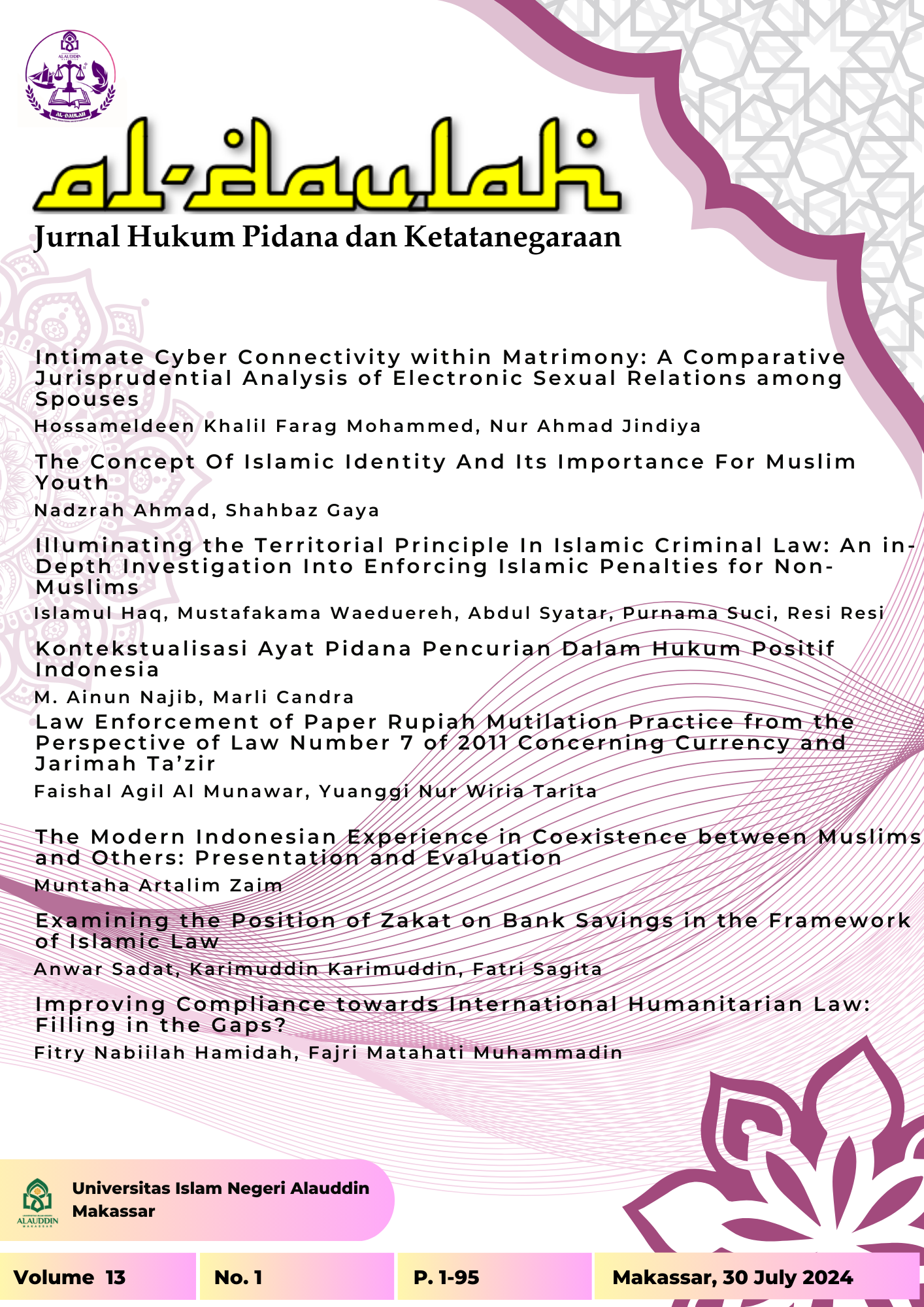Contextualization of Theft Criminal Verse in Indonesian Positive Law
Abstract
The widespread abandonment of Islamic Criminal Law reveals a significant lack of comprehensive understanding of its principles. Many legal systems operate under the assumption that they are entirely separate from Islamic law, yet Islamic thinkers have historically influenced various global legal systems, including the approach to punishment for theft. Thus, there is a need to contextualize Islamic Criminal Law to illustrate that it can adapt to modern times. This research employs a normative legal framework with a conceptual and comparative approach, focusing on the crime of theft as addressed in Islamic criminal law, Indonesian positive law, and Iranian positive law. The study concludes that these three legal systems share a common goal: to deter theft. However, the forms of punishment differ. Indonesian positive law primarily emphasizes imprisonment as the main consequence. In contrast, Islamic criminal law advocates for hand-cutting, intending to deter future criminal behavior. Iranian law, on the other hand, incorporates multiple levels of punishment, ranging from finger-cutting to imprisonment as a last resort. Ultimately, each legal system determines the appropriate sentence for theft based on the context of the crime, the offender's background, and the specific circumstances surrounding the event
References
Al-Anshari, Zakariyya. Ghayah al-Wushul. Surabaya: Al-Hidayah, n.d.
Al-Fādanī, Muhammad Yāsīn Ibn ‘Īsā. Ḥusn Al-Ṣiyāghah. Rembang: Al-Maktabah Al-Anwariyah, n.d.
Al-Ḥafīd, Ibn Rushd. Bidāyah Al-Mujtahid Wa Nihāyah Al-Muqtaṣid. Kairo: Dar Al-Hadis, 2004.
Al-Qaradhawi, Yusuf. Perkembangan Fiqh Antara Statis Dan Dinamis. Translated by Saifullah M. Yunus. Kairo: Maktabah Wahbah, 2022.
Al-Raḥman, Bahauddin Abd. Al-‘Iddah Sharḥ Al-‘Umdah. Kairo: Dar Al-Hadis, 2003.
Al-Ramlī, Shihābuddīn. Nihāyah Al-Muḥtāj Ilā Sharḥ Al-Minhāj. Beirut: Dar Al-Fikr, 1983.
Al-Zuhailī, Waḥbah. Al-Fiqh Al-Islāmī Wa Adillatuhū. Suriah: Dar Al-Fikr, 1989.
Al-Zuhri, Muhammad. Al-Sirāj Al-Wahhāj ‘alā Matni Al-Minhāj. 8th ed. Beirut, Lebanon: Dar Al-Kotob Al-Ilmiyah, 2016.
Basyit, Abdul. “Pengaruh Pemikiran Ibn Taymiyyah Di Dunia Islam.” Rausyan Fikr : Jurnal Pemikiran Dan Pencerahan 15, no. 2 (2019). https://doi.org/10.31000/rf.v15i2.1810.
Garfes, Harry Pribadi, and Khairunnas. “Batasan Memukul Anak Untuk Melaksanakan Sholat Menurut Hukum Islam Dan Hukum Positif.” Islamitsch Familierecht Journal 2, no. 02 (2021): 106–25. https://doi.org/10.32923/ifj.v2i02.2015.
Ghulām, Zakariyya ibn. Min Uṣūl Al-Fiqh ‘Alā Manhaj Ahli Al-Ḥadīth. Dar Al-Kharaz, 2002.
Hakim, Abdul Hamid. Al-Sullam. Jakarta: Makatabah As-Saadiyah Putra, 2008.
Kusnandar, Viva Budy. “RISSC: Populasi Muslim Indonesia Terbesar Di Dunia.” databoks, 2021.
Marsaid. Al-Fiqh Al-Jinayah (Hukum Pidana Islam) Memahami Tindak Pidana Dalam Hukum Islam. Edited by Jauhari. Palembang: CV. Amanah, 2020.
Miswanto, Agus. Ushul Fiqh: Metode Ijtihad Hukum Islam. Magelang: Unimma Press, 2019.
Muhammad, Abdullah ibn. Majma’ Al-Anhar Fī Sharḥ Multaqā Al-Abḥar. Turki: Al-Matba’ah Al-’Amirah, 1328.
National Legislative Bodies / National Authorities. “Iran: Islamic Penal Code,” 1991.
Nota Kesepakatan Bersama Ketua Mahkamah Agung Republik Indonesia, Menteri Hukum dan Hak Asasi Manusia Republik Indonesia, Jaksa Agung Republik Indonesia, Kepala Kepolisian Republik Indonesia Tentang Pelaksanaan Penerapan Penyesuaian Baasan Tindak Pidana R (2012).
Panca, Anang. “Info Terbaru Harga 1 Dinar Emas Saat Ini.” harga.web.id, 2022.
Penyusun Mu’tamar Islam di Jedah. Majallah Majma’ Al-Fiqh Al-Islami. Maktabah Al-Shamilah, 2008.
Qudāmah, Ibn. ’Umdah Al-Fiqh. Al-Maktabah Al-Ashriyah, 2004.
Rahardjo, Satjipto. “Hukum Progresif: Hukum Yang Membebaskan.” Jurnal Hukum Progresif 1, no. 1 (2011): 1–24. https://doi.org/https://doi.org/10.14710/hp.1.1.1-24.
Rokhmadi. Hukum Pidana Islam. Semarang: CV. Karya Abadi Jaya, 2015.
Sa’īd, Abū Al-Ḥasan ‘Alī Ibn. Manāhij Al-Tahṣīl Wa Natāij Laṭāif Al-Ta’wīl. Dar Ibn Hazm, 2007.
Copyright (c) 2024 M. Ainun Najib, Marli Candra

This work is licensed under a Creative Commons Attribution 4.0 International License.
The authors of a work hold the copyright and grant the Al-Daulah: Jurnal Hukum Pidana dan Ketatanegaraan the right of first publication. The work is also licensed under the Creative Commons Attribution License (CC BY 4.0), which enables others to share the work while acknowledging the authorship and initial publication in the journal. The authors can make separate contractual agreements for the non-exclusive distribution of the published version of the work, such as by posting it to an institutional repository or editing it for a book, with an acknowledgment of its initial publication in this journal. Authors are allowed and encouraged to post their work online, such as in institutional repositories or on their website, before and during the submission process. This can lead to productive exchanges and greater citation of the published work.


